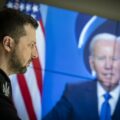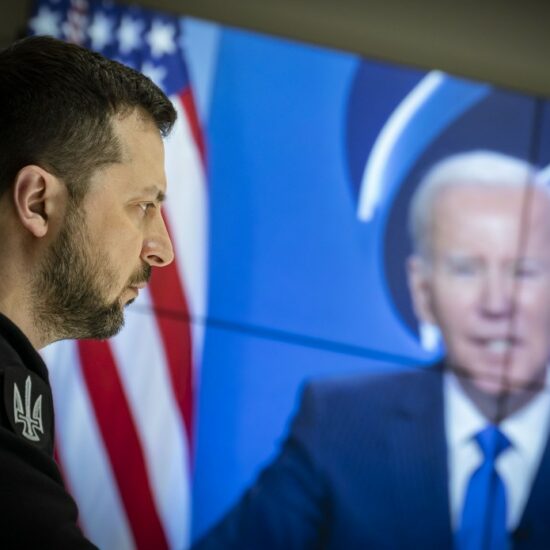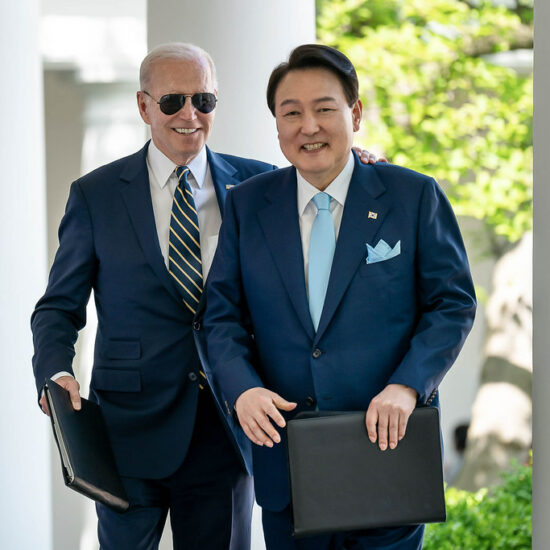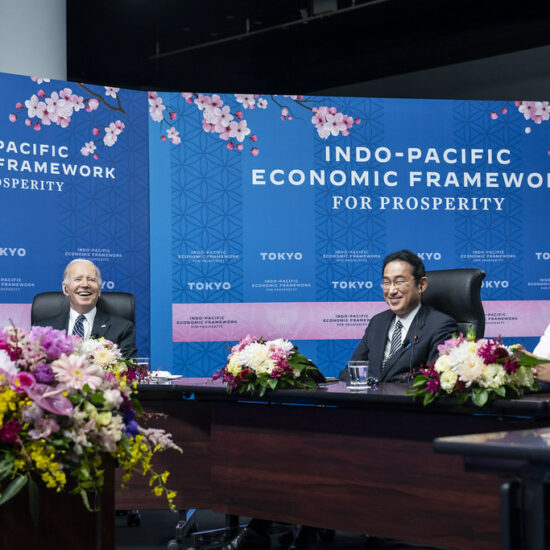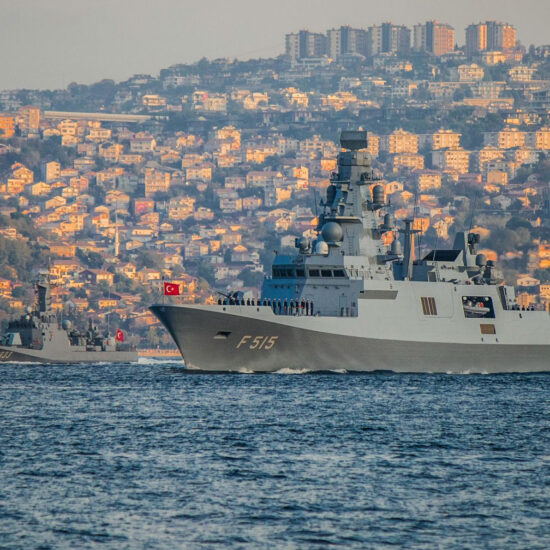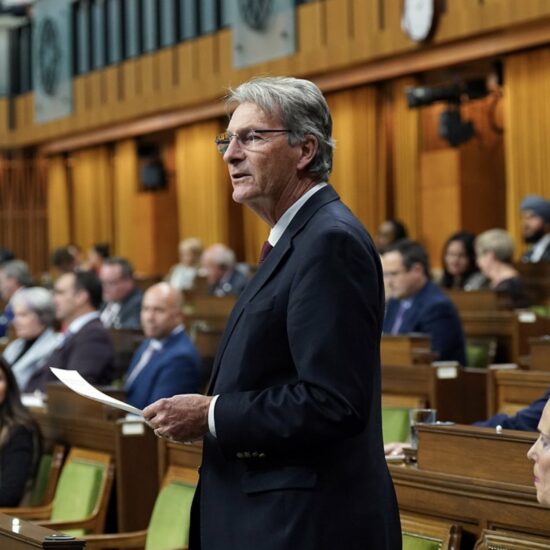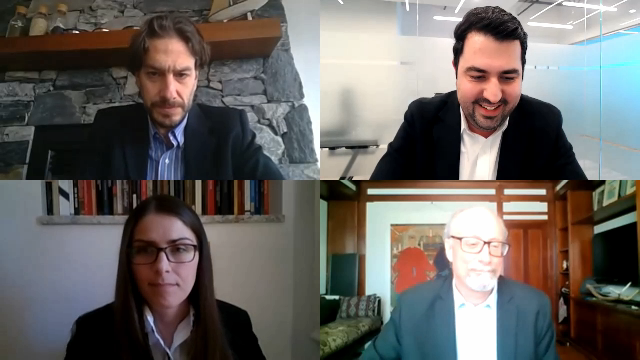
Here is a summary of the discussions prepared by IPD research associate Pouyan Kimiayjan:
On February 4th, 2021 the Institute for Peace & Diplomacy (IPD) hosted a panel discussion titled “US-China relations under the Biden administration”. Our three distinguished panelists include: Robert S. Ross, Professor of Political Science at Boston College and Associate at the Fairbank Centre for Chinese Studies, Harvard University, Jeffrey Reeves, Vice-President of Research at the Asia Pacific Foundation of Canada, and Rachel Esplin Odell, Research Fellow at the Quincy Institute’s East Asia Program. This panel discussion was moderated by Bijan Ahmadi, Executive Director at the Institute for Peace & Diplomacy.
The panel focused on answering the following questions:
- What is the current state of US-China relations and how will the Biden administration shape US policy on China?
- Will the Biden administration form new alliance frameworks to deal with China and is there enough support among US regional allies for a tougher US-led coalition against China?
The panel began with a discussion of the current state of US-China bilateral relations and the new administration’s China policy. Professor Robert Ross pointed out that “we are in a period of great flux,” as US officials have so far sent mixed signals on China–some in the Biden administration have discussed cooperation, whereas other officials have stressed the need for re-establishing US supremacy. Irrespective of why the US has yet to employ coherent messaging on China, Ross argued that two understand the approach of the new administration one must focus on actions and trends, rather than rhetoric. The new administration might see the need to employ hardline rhetoric while demonstrating flexibility when engaging with China. The Chinese will also focus on US policy and actions, rather than rhetoric intended for domestic consumption.
The panel discussion was held before President Biden’s foreign policy speech on February 4th but based on excerpts released earlier in the day, Dr. Rachel Odell pointed out that President Biden’s speech discussed restoring US alliances and added that his administration intends to engage “adversaries” and “competitors” to advance American national interests. Dr. Odell also mentioned that Biden’s foreign policy speech could provide indicators on how the new administration will shape US policy on China. In Dr. Odell’s opinion, Biden’s characterization of adversaries and competitors provides flexibility and room to identify China as a “competitor” instead of an adversary and signal a return to diplomacy with China.
With respect to Secretary Blinken’s remarks during the confirmation hearings on the Trump team having the right idea but the wrong approach to China, Odell believes that the Biden administration is also signaling that there will not be a complete break with the previous administration on China policy.
Odell concluded that the focus of the Biden administration will be on resolving domestic issues, and perhaps on discussing China within that domestic framework, rather than prioritizing China as a foreign policy issue.
Dr. Jeffrey Reeves agreed that the new administration will focus on domestic priorities. However, he added that based on newly appointed officials in the US government, there appears to be a degree of agreement that China remains a strategic challenger and that a tough approach is needed to manage the bilateral relationship. Moreover, there are indications that human rights and democracy will be a focus as it relates to US policy on China. On the operational level, the new foreign policy team has more experience and professionalism in contrast to their predecessors. US National Security Advisor Jake Sullivan’s recent remarks on the four pillars of the US’ China policy also provides clear indications of Biden’s approach towards China. Reeves argued that the US must not stoke domestic tensions within Beijing in an attempt to undermine the current leadership and must also refrain from moving too aggressively on Taiwan.
In response to the second question on the potential formation of a new alliance framework, Ross identified ‘the Quad’ (consisting of India, Japan, the US, and Australia) as the basis for the Indo-Pacific strategy. Ross added that in its Indo-Pacific strategy, the US is looking for partners outside the East Asian waters to cooperate with the US in dealing with China. In his opinion, there is a general recognition that US capabilities or access to facilities in South Korea, Philippines, or Singapore are no longer assured because of the rise of China and therefore the US is “moving out”. Ross stressed that the Quad would be willing to cooperate with the US but they want to be able to manage their own relationship with China while simultaneously enhancing their strategic cooperation with the US.
Odell also pointed out that National Security Advisor Jake Sullivan said recently that the Biden administration considers the Quad as the cornerstone of US security cooperation going forward, not just to counter China but also to improve security cooperation between these countries.
Reeves cautioned that India has an independent foreign policy and it does not necessarily share the same strategic outlook that other Quad member states do with respect to the Indo-Pacific region. Ross disagreed with Reeves, arguing that given China is now challenging sea lanes and trade routes within the Indian sphere, there is increased Indian defense cooperation with the US.
In the next section, the moderator moved on to questions specifically for each panelist and questions from the audience. In response to a question on whether Washington is ready to shift US regional posture away from the pursuit of primacy and regional dominance, Odell pointed to a Foreign Affairs article, written by Kurt Campbell and Jake Sullivan, where the two argued that maintaining regional dominance should no longer be a priority, and instead the US ought to re-think its approach in the region. Odell argued that the US no longer has dominance in either the region’s economic or military domains.
Ross also noted that regional powers in Asia feel more independent in their decision making. Ross argued that we must avoid a cold war analogy, given the profound differences between Europe and Asia. He believes that there will be greater fluidity in relationships in East Asia.
Ahmadi then asked what aspects of the Trump administration’s China policy must be maintained by the current administration. Ross responded by arguing that Biden should follow the Trump administration’s approach to the Pentagon ensuring adequate funding is provided. However, he stressed that adopting a tough approach on China across the board and trying to contain China was a misguided approach.
Bijan Ahmadi asked Odell a question regarding the need to expand trade relations in East Asia and how such an increase in trade ties can advance US interests. Odell asserted that concerns regarding trade and economic relations have been overblown by the Trump administration amid the rise of nationalism in the US and shortcomings in dealing with the pandemic. In her opinion, trade with China has been massively beneficial to the US. The negative impacts of trade can mostly be attributed to the domestic failure of the US political leadership.
In response to a question about the Biden administration’s approach to dealing with the extradition case of Meng Wanzhou and the arbitrary arrest of the two Canadians, Michael Kovrig and Michael Spavor, Reeves responded that there have been positive signs indicating that the Biden administration will follow up on the release of the two Michaels as a matter of priority. However, he expressed concern that based on his discussions, some in Washington do not see the extradition case and the detention of the two Michaels linked. Reeves stated that he believes there has to be a comprehensive approach and the US needs to view the Meng Wanzhou case as part of the problem. Reeves added that the Biden administration will have to “do some creative thinking about how to get Canada out of a situation that ultimately the Trump administration put it in by making the extradition request in the first place.”
In response to a question from the audience about US-China cooperation on issues of mutual interest, such as climate change, Odell argued that the US will not trade climate issues with matters that concern its national interests. The US will however move towards a new international climate deal, where there could be an opportunity for bilateral and multilateral cooperation with China. The new administration has also signaled its interest in re-establishing public health relations. Odell warned that the Biden team might be too “sanguine” in believing that it can maintain strategic competition alongside cooperation on issues of mutual interest. She expressed concern that competition in strategic and military arenas can worsen global efforts to mitigate climate change. She explained that attempts to contain China will lead to an increased sense of insecurity which will compel Chinese leaders to lessen their dependence on oil imports and rather focus on developing their domestic coal sector.
Lastly, an audience member asked about the permanence of the US congress bipartisan consensus concerning China. Ross responded by discussing the inevitability of US-China strategic competition but emphasizing that there are talks within China and the US that boundaries must be established. Odell added that there is not much political incentive for members of Congress to advocate for cooperation. She added that the co-chairs of the US-China working group, both Democrats and Republicans, are pragmatic and call themselves “salvagers” of the relationship but many policies on China are decided by the executive branch. Nevertheless, on the progressive side of the Democratic Party, there is resistance to a new cold war. Reeves also weighed in, arguing that the rise of nationalism within the Republican Party and placing responsibility on China for all negative consequences of globalization will create obstacles for US-China cooperation.

